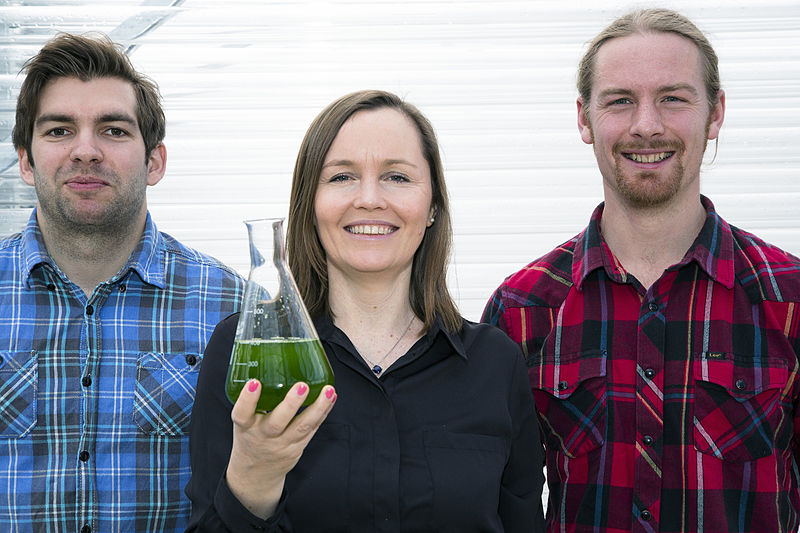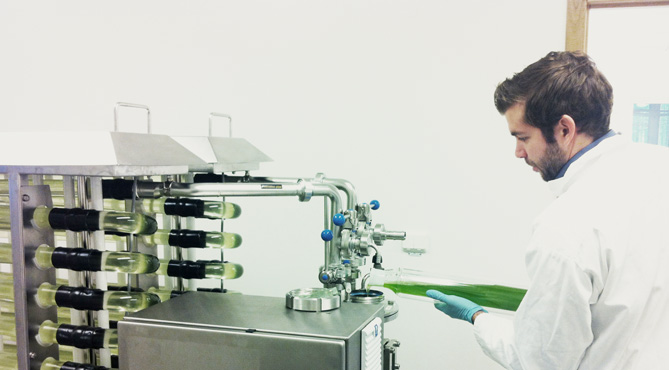By running an innovative microalgae farm in Hammenhög, Sweden, Simris Alg produces a vegan and GMO-free Omega-3 fatty acid alternative to oily fish derivatives for industry. This Swedish start-up is winning all kinds of awards for their almost too-good-to-be-true approach to dietary Omega-3 oils.

The Swedish entrepreneur Fredrika Gullfot (CEO) has improved upon a sustainable alternative to producing Omega-3 oils through a pioneering form of algae-growing agribusiness, using around 2,000 m2 of greenhouses. Gullfot (KTH, Stockholm) considers herself a ‘green capitalist’ having been one of the 12 winners of the Wired Innovation Fellowship 2015. Officially, Simiris Alg is also partnered with the Dutch AlgaePARC in Wageningen, which has a unique pilot plant designed to research algal micro-cultivation. It is one of the largest research projects on industrial macro-scale cultivation of microalgae in Europe.
Two types of Omega-3 fatty acids (EPA and DHA) are derived exclusively through eating oily marine fish, which accumulate them through their plankton (microalgae) diet. Apparently it can take up to 600 sardines to make a single bottle of Omega-3 oil capsules, a figure which strikes a guilty nerve in our conscience: we want the health benefits of taking fish-based supplements but we also want to discourage over-fishing. Thus, by instead cultivating the original autotrophic source of energy, the algal yield, quality and sustainability can be dramatically increased.

This approach has therefore become massively profitable in industry – such as in the case of baby formula, 90% of which contains Omega-3 DHA. Competitors such as the French biotech Fermentalg have begun to spring up everywhere, anticipating the global market for Omega-3 and Omega-6 products to grow by 6% annually until 2023, and a projected annual revenue turnover of €400M. It’s for this reason, Simris is planning to expand its agribusiness to include England and Japan, where Omega-3 supplements are in particular demand.
Simris takes this competition in their stride, employing an open and (in my opinion) quite ‘hipster’ approach to marketing their products. They do this by being fairly transparent about their industrial process, complemented with atmospheric photos of Southern Sweden and trippy promo-clips. Making a point to avoid genetically modifying microalgal strains, the company instead claims to screen certain wild-types and exploit the natural diversity within microalgal communities to optimize yield.

The organic Omega-3 oils are extracted by a mechanized churning of the algal mulch and avoiding the use of solvent-extraction, which Simris deems as environmentally unsustainable. As a result, the gentle centrifugation process creates a green paste which supports live organic matter. Seeing as Simris wishes to distance itself as much as possible from the GMO label (particularly with current political shenanigans surrounding their legitimacy) it is not entirely clear what ‘making their own seawater’ means, even if it is recycled with each new culture batch.
So one question remains – will the mechanical ‘GMO-free’ approach to micro-algae cultivation taken by Simris ‘win’ when up against pro-GMO companies such as Fermentalg? Let us know what you think…





